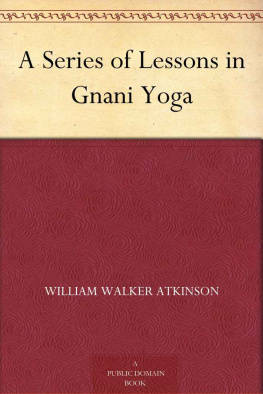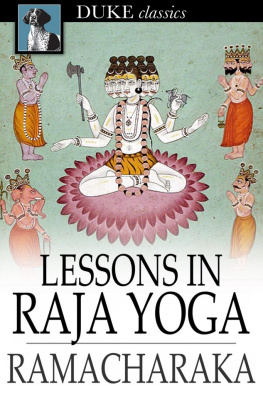William Walker Atkinson - A Series of Lessons in Gnani Yoga
Here you can read online William Walker Atkinson - A Series of Lessons in Gnani Yoga full text of the book (entire story) in english for free. Download pdf and epub, get meaning, cover and reviews about this ebook. City: Hamburg, year: 2011, publisher: tredition, genre: Religion. Description of the work, (preface) as well as reviews are available. Best literature library LitArk.com created for fans of good reading and offers a wide selection of genres:
Romance novel
Science fiction
Adventure
Detective
Science
History
Home and family
Prose
Art
Politics
Computer
Non-fiction
Religion
Business
Children
Humor
Choose a favorite category and find really read worthwhile books. Enjoy immersion in the world of imagination, feel the emotions of the characters or learn something new for yourself, make an fascinating discovery.
- Book:A Series of Lessons in Gnani Yoga
- Author:
- Publisher:tredition
- Genre:
- Year:2011
- City:Hamburg
- Rating:5 / 5
- Favourites:Add to favourites
- Your mark:
- 100
- 1
- 2
- 3
- 4
- 5
A Series of Lessons in Gnani Yoga: summary, description and annotation
We offer to read an annotation, description, summary or preface (depends on what the author of the book "A Series of Lessons in Gnani Yoga" wrote himself). If you haven't found the necessary information about the book — write in the comments, we will try to find it.
William Walker Atkinson: author's other books
Who wrote A Series of Lessons in Gnani Yoga? Find out the surname, the name of the author of the book and a list of all author's works by series.
A Series of Lessons in Gnani Yoga — read online for free the complete book (whole text) full work
Below is the text of the book, divided by pages. System saving the place of the last page read, allows you to conveniently read the book "A Series of Lessons in Gnani Yoga" online for free, without having to search again every time where you left off. Put a bookmark, and you can go to the page where you finished reading at any time.
Font size:
Interval:
Bookmark:
Lessons in Gnani Yoga (The Yoga of Wisdom.)
I. The One 1
II. Omnipresent Life 27
III. The Creative Will 51
IV. The Unity of Life 75
V. The One and the Many 101
VI. Within the Mind of the One 127
VII. Cosmic Evolution 153
VIII. The Ascent of Man 177
IX. Metempsychosis 203
X. Spiritual Evolution 229
XI. The Law of Karma 253
XII. Occult Miscellany 277
The Yogi Philosophy may be divided into several great branches, or fields. What is known as "Hatha Yoga" deals with the physical body and its control; its welfare; its health; its preservation; its laws, etc. What is known as "Raja Yoga" deals with the Mind; its control; its development; its unfoldment, etc. What is known as "Bhakti Yoga" deals with the Love of the AbsoluteGod. What is known as "Gnani Yoga" deals with the scientific and intellectual knowing of the great questions regarding Life and what lies back of Lifethe Riddle of the Universe.
Each branch of Yoga is but a path leading toward the one endunfoldment, development, and growth. He who wishes first to develop, control and strengthen his physical body so as to render it a fit instrument of the Higher Self, follows the path of "Hatha Yoga." He who would develop his will-power and mental faculties, unfolding the inner senses, and latent powers, follows the path of "Raja Yoga." He who wishes to develop by "knowing"by studying the fundamental principles, and the wonderful truths underlying Life, follows the path of "Gnani Yoga." And he who wishes to grow into a union with the One Life by the influence of Love, he follows the path of "Bhakti Yoga."
But it must not be supposed that the student must ally himself to only a single one of these paths to power. In fact, very few do. The majority prefer to gain a rounded knowledge, and acquaint themselves with the principles of the several branches, learning something of each, giving preference of course to those branches that appeal to them more strongly, this attraction being the indication of need , or requirement, and, therefore, being the hand pointing out the path.
It is well for every one to know something of "Hatha Yoga," in order that the body may be purified, strengthened, and kept in health in order to become a more fitting instrument of the Higher Self. It is well that each one should know something of "Raja Yoga," that he may understand the training and control of the mind, and the use of the Will. It is well that every one should learn the wisdom of "Gnani Yoga," that he may realize the wonderful truths underlying lifethe science of Being. And, most assuredly every one should know something of Bhakti Yogi, that he may understand the great teachings regarding the Love underlying all life.
We have written a work on "Hatha Yoga," and a course on "Raja Yoga" which is now in book form. We have told you something regarding "Gnani Yoga" in our Fourteen Lessons, and also in our Advanced Course. We have written something regarding "Bhakti Yoga" in our Advanced Course, and, we hope, have taught it also all through our other lessons, for we fail to see how one can teach or study any of the branches of Yoga without being filled with a sense of Love and Union with the Source of all Life. To know the Giver of Life, is to love him, and the more we know of him, the more love will we manifest.
In this course of lessons, of which this is the first, we shall take up the subject of "Gnani Yoga"the Yoga of Wisdom, and will endeavor to make plain some of its most important and highest teachings. And, we trust that in so doing, we shall be able to awaken in you a still higher realization of your relationship with the One, and a corresponding Love for that in which you live, and move and have your being. We ask for your loving sympathy and cooperation in our task.
Let us begin by a consideration of what has been called the "Questions of Questions"the question: "What is Reality?" To understand the question we have but to take a look around us and view the visible world. We see great masses of something that science has called "matter." We see in operation a wonderful something called "force" or "energy" in its countless forms of manifestations. We see things that we call "forms of life," varying in manifestation from the tiny speck of slime that we call the Moneron, up to that form that we call Man.
But study this world of manifestations by means of science and researchand such study is of greatest valuestill we must find ourselves brought to a point where we cannot progress further. Matter melts into mysteryForce resolves itself into something elsethe secret of living-forms subtly elude usand mind is seen as but the manifestation of something even finer. But in losing these things of appearance and manifestation, we find ourselves brought up face to face with a Something Else that we see must underlie all these varying forms, shapes and manifestations. And that Something Else, we call Reality, because it is Real, Permanent, Enduring. And although men may differ, dispute, wrangle, and quarrel about this Reality, still there is one point upon which they must agree, and that is that Reality is One that underlying all forms and manifestations there must be a One Reality from which all things flow. And this inquiry into this One Reality is indeed the Question of Questions of the Universe.
The highest reason of Manas well as his deepest intuitionhas always recognized that this Reality or Underlying Being must be but ONE, of which all Nature is but varying degrees of manifestation, emanation, or expression. All have recognized that Life is a stream flowing from One great fount, the nature and name of which is unknownsome have said unknowable. Differ as men do about theories regarding the nature of this one, they all agree that it can be but One. It is only when men begin to name and analyze this One, that confusion results.
Let us see what men have thought and said about this Oneit may help us to understand the nature of the problem.
The materialist claims that this one is a something called Matterself-existenteternalinfinitecontaining within itself the potentiality of Matter, Energy and Mind. Another school, closely allied to the materialists, claim that this One is a something called Energy, of which Matter and Mind are but modes of motion. The Idealists claim that the One is a something called Mind, and that Matter and Force are but ideas in that One Mind. Theologians claim that this One is a something called a personal God, to whom they attribute certain qualities, characteristics, etc., the same varying with their creeds and dogmas. The Naturistic school claims that this One is a something called Nature, which is constantly manifesting itself in countless forms. The occultists, in their varying schools, Oriental and Occidental, have taught that the One was a Being whose Life constituted the life of all living forms.
All philosophies, all science, all religions, inform us that this world of shapes, forms and names is but a phenomenal or shadow worlda show-worldback of which rests Reality, called by some name of the teacher. But remember this, all philosophy that counts is based upon some form of monismOnenesswhether the concept be a known or unknown god; an unknown or unknowable principle; a substance; an Energy, or Spirit. There is but Onethere can be but Onesuch is the inevitable conclusion of the highest human reason, intuition or faith.
And, likewise, the same reason informs us that this One Life must permeate all apparent forms of life, and that all apparent material forms, forces, energies, and principles must be emanations from that One, and, consequently "of" it. It may be objected to, that the creeds teaching a personal god do not so hold, for they teach that their God is the creator of the Universe, which he has set aside from himself as a workman sets aside his workmanship. But this objection avails naught, for where could such a creator obtain the material for his universe, except from himself; and where the energy, except from the same source; and where the Life, unless from his One Life. So in the end, it is seen that there must be but Onenot two, even if we prefer the terms God and his Universe, for even in this case the Universe must have proceeded from God, and can only live, and move and act, and think, by virtue of his Essence permeating it.
Font size:
Interval:
Bookmark:
Similar books «A Series of Lessons in Gnani Yoga»
Look at similar books to A Series of Lessons in Gnani Yoga. We have selected literature similar in name and meaning in the hope of providing readers with more options to find new, interesting, not yet read works.
Discussion, reviews of the book A Series of Lessons in Gnani Yoga and just readers' own opinions. Leave your comments, write what you think about the work, its meaning or the main characters. Specify what exactly you liked and what you didn't like, and why you think so.














